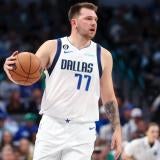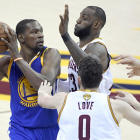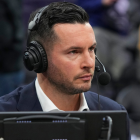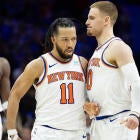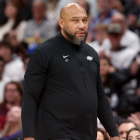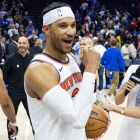Cleveland is tripling down, so to speak.
Over the past two years since the Cavaliers' first loss to the Warriors in the 2015 Finals when their ground-and-pound style -- particularly without the injured Kyrie Irving and Kevin Love, Cleveland has tried to constantly upgrade its 3-point shooting at the expense of other options. First, the Cavs acquired Channing Frye instead of an alternative rim protector. Next they went for Kyle Korver, then Deron Williams, while shedding Timofey Mozgov. These moves made them more powerful, and did nothing to hinder their ability to reach the Finals.
What suffered, of course, was the defense. The Cavaliers literally had the worst defensive rating of any team to reach the Finals in NBA history last season. The second-worst? The 2015 Cavs. But the Cavs gambled that they could find their defense in the playoffs even with a roster short on plus defenders, and that the extra offensive firepower would let them overwhelm teams. To a degree, it worked. They set postseason records for the most made 3s, and led the league in 3-point rate last season. The Cavs have absolutely bombed from deep.
Of course, the bottom fell out against Golden State. Cleveland's offense was fine in the Finals. It had offensive ratings above 105 in every game after Game 1 against the Warriors. But the Cavs' defense was a bowl of pasta on a railroad track with a bullet train coming through.
So now it's a new season. Irving is gone to Boston, Isaiah Thomas won't be back for months. The Cavs added two non-shooters in Derrick Rose and Dwyane Wade. They also, interestingly, added Jae Crowder, a legitimate defensive boost who doesn't cost them on the offensive end. As a result, word broke this week that the Cavs plan to move Kevin Love to center, presumably starting Rose, Wade, LeBron James, Crowder and Love.
This is a monstrous gamble ... but there are also ways it can pay off.
The Crowder Factor
Offensively, this works great. LeBron prefers, and works best offensively, when he's surrounded by shooters. He's such a beast athletically, with such tremendous vision, giving him spacing to punish any help that has to be sent, or to punish staying home and leaving him one-on-one is ideal. So Crowder, a great spot-up shooter, is terrific as a combo-forward spotting up. Love's obviously a great weapon on the perimeter. But what balances this is both Crowder, with his athleticism, and Love, with his athleticism and nose for the ball, can be effective offensive rebounders.
So even with Rose and Wade not effective as floor spacers, they are both good cutters, slashers and rebounders. Wade's also still an incredible passer. Rose is the only concern as far as ball-stopping goes (and he swears he's "getting back to being a distributor" in Cleveland). So with James as the engine, this is still an elite offensive unit.
Defensively is where things get really dicey very quickly. Wade and Rose have both lost a step, which means their defensive ability to contain has as well.
Here's what Crowder's great at defensively: running off shooters on spot-ups, recovery, disrupting isolation and containing plays, and forcing turnovers with quick hands and muscling for loose balls.
Here's what Crowder's not as good at: containing super-fast guards off the switch (not that anyone in the league is great at that, it's impossible), and fighting through screens. So there should be some concern about 1-4 pick and rolls, especially on switches:
Crowder's great at running off pick and pops, though, better than Love with his mobility:
Crowder being cross-matched on fewer shooter 3s and 2-guards is good, and he's better on switches than Love would be. So there are ways to make this work. The Celtics lineup with the most minutes featuring Crowder at the four was a plus-5 per 100 possessions, and while the defense was rough (111 defensive rating), the offense was better. It can work. The bigger issues are, of course, with Love replacing Thompson.
The Golden (State) Elephant In The Room
The Cavaliers were better with Love on the floor with Thompson defensively, but not by that much (0.8 points per 100 possessions) and they were actually worse with that pairing in the playoffs than with Love on the floor without Thompson.
Here's the killer: In the 18 minutes per game the Cavaliers had Love with Thompson on the floor vs. the Warriors in the Finals, their defensive rating was an eye-gouging, vomit-inducing 133.5. With Love on the floor and Thompson on the bench, it dropped to 99.4. Likewise, their defense was better with Thompson on court and Love off. Now, this is a very small sample that can be explained as simply as "Kevin Love played really well in the Finals" (seriously) and Tristan Thompson played very badly in the Finals (again, very seriously). But it does show that separating the two won't be catastrophic. And with Thompson on the bench, if the defense does get into trouble, they can deploy him.
It's also harder for teams, specifically the Warriors, to seek out Love in switches at the five-spot. When the Warriors run pick and roll, they do run with Zaza Pachulia or JaVale McGee frequently, but their more dangerous combo is with Draymond Green or one of the wings. By moving Love to the five, Cleveland can make the most of Love's renewed defensive effort and ability from last year, while also hiding more effectively.
The Tristan Follow-Up
There is, of course, an uncomfortable follow-up on this. Thompson has three years and over $52.4 million left on his contract. Is that money you want to pay for a backup center? In today's NBA, where traditional centers like Thompson are losing value by the second, even championship-caliber rim protectors and pick-and-roll finishers like Thompson? There's every reason to believe that Thompson will split time with Love depending on the matchup, or eventually move back into the starting unit permanently if this experiment fails. But if it doesn't, if Love as the starting five works, it makes Thompson not so much as expendable as a luxury that might best be used in other ways ... like a trade.
This is jumping way ahead, but the point is simply to illustrate the ripple effects that moves like this starting lineup shift can trigger. If Thompson isn't necessary, it makes him easier to move. Take for example the ongoing rumors that the Cavaliers (along with the Celtics) could make a play for Grizzlies center Marc Gasol if things go south. The Grizzlies maintain Gasol is untouchable in trade talks. If things go south dramatically for them this season, though, who knows? At that point, the Cavaliers can call with an offer centered around first-round picks, expiring contract filler and Thompson.
It's still unlikely that Thompson is moved, of course, but having the kind of money tied up in Love and Thompson for two players that aren't sharing the floor the majority of the time is tricky. What's trickier is that this move inherently indicates that Thompson's less valuable in the NBA. A bounce-back season could certainly change that, but he'd still be fighting against the tide.
The Complication
If the Cavaliers are going to keep pace this season, let alone figure out a way to do the impossible and topple the Warriors, they have to improve their defense. Even with the data showing that Crowder works at the four and that Love without Thompson can be as or more effective, there are big-picture concerns. A starting lineup of Rose, Wade, James, Crowder and Love features three marginal-to-bad defenders at this point in their careers.
These are mostly new players to the system, and things won't get any easier on that end when Thomas is healthy. The Cavaliers have ensured they'll still have the offensive firepower to make yet another trip to the Finals, but as far as getting this team to the level they need to compete with the best teams in the league, let alone Golden State, there are, as always, more questions than answers with Cleveland.









